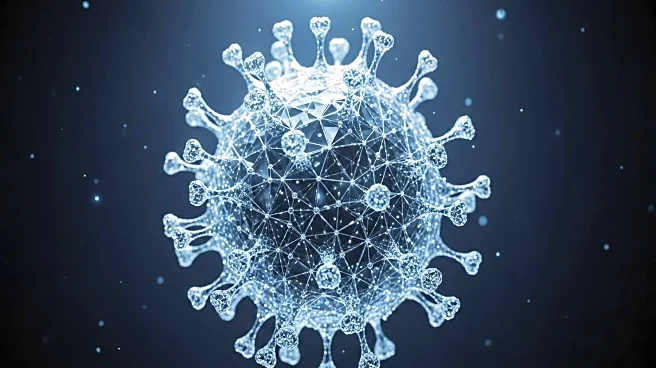What is the story about?
What's Happening?
Stanford researchers have achieved a groundbreaking development in biotechnology by using artificial intelligence to design biological viruses from scratch. The team trained AI models to write entire virus genomes, successfully synthesizing several AI-generated bacteriophages in the lab. These custom phages demonstrated the ability to infect and kill drug-resistant E. coli bacteria, showcasing AI's potential to create new biomedical therapies. This marks the first time AI systems have been able to write coherent genome-scale sequences, according to lead computational biologist Brian Hie. The research, although not yet peer-reviewed, suggests that AI could be instrumental in designing bespoke viruses to combat superbugs that have evolved antibiotic resistance.
Why It's Important?
The ability to design viruses using AI could have significant implications for the field of biotechnology and medicine. This approach may lead to the development of new therapies for treating infections caused by drug-resistant bacteria, addressing a critical challenge in public health. The potential to create custom microbes tailored to specific pathogens could revolutionize how diseases are treated, offering a new avenue for combating antibiotic resistance. However, this advancement also raises bioethical concerns, as synthesizing viruses carries inherent risks. The research highlights AI's growing power to manipulate biological systems, which could lead to innovative solutions in healthcare but also necessitates careful consideration of ethical implications.
What's Next?
Further experimental advances are needed before AI-designed organisms more complex than simple viruses can be realized. The research team acknowledges that while the success with AI-crafted phages is promising, there is still a long way to go before AI can design more complex life forms. Future studies will likely focus on refining the AI models and exploring the practical applications of AI-designed viruses in medical treatments. Additionally, the bioethical implications of this technology will need to be addressed, ensuring that the benefits of AI in biotechnology are balanced with safety and ethical considerations.
Beyond the Headlines
The development of AI-designed viruses opens up discussions on the ethical and safety concerns associated with creating synthetic life forms. As AI continues to advance in the field of genetic engineering, it is crucial to establish guidelines and regulations to prevent misuse and ensure responsible innovation. This breakthrough also highlights the potential for AI to contribute to solving complex biological problems, pushing the boundaries of what is possible in genetic research and therapy.
















